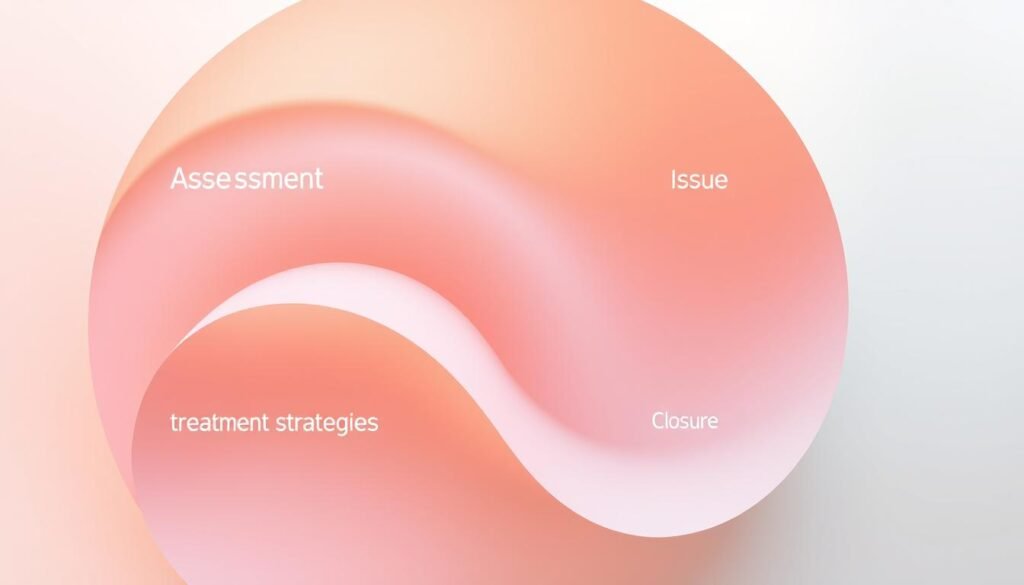About 35% of those with major depression also face big troubles in their relationships. This fact points out how closely linked our mental well-being and personal connections are. Interpersonal Psychotherapy (IPT) steps in as an effective way to treat these issues. It not only helps lift the fog of mood disorders but also looks into how our relationships impact our feelings. By working closely with patients, IPT therapists reveal how these social ties affect our mood.
This understanding is key to making treatment plans that work well. They take into account both our inner feelings and our relationships with others. This makes IPT a unique and impactful approach to improving mental health.
Key Takeaways
- Interpersonal Psychotherapy (IPT) is a structured treatment designed to address interpersonal issues linked to depression.
- IPT spans typically 12–16 weeks and is primarily utilized during the acute phase of major depression.
- The therapy not only targets mood disorders but is also effective in treating conditions like anxiety, bulimia, and chronic fatigue.
- Through IPT, patients can develop a stronger therapeutic alliance with their therapists, enhancing treatment outcomes.
- IPT has proven effective across various age groups, making it accessible to adolescents as well as older adults.
- Research indicates that IPT can serve as both a stand-alone treatment and in combination with medication.
- The ultimate goals of IPT are symptom remission and enhanced interpersonal functioning.
Understanding Depression and Its Impact on Relationships
Depression greatly affects how we feel and connect with people. It makes it hard for people with mood disorders to join in social activities. This often leads to feeling left out.
Depression doesn’t only hurt the person who has it. It also affects their friends, family, and workmates. This can lead to misunderstandings because it’s hard for them to share their feelings. Both sides feel more distant over time.
Having people who care for you can really help fight depression. Good relationships can make someone feel better and less alone. But, not having support can make things worse. It’s important to keep relationships strong, even when dealing with depression.
| Aspect | Positive Impact | Negative Impact |
|---|---|---|
| Emotional Support | Reduces feelings of isolation | Increases loneliness if lacking |
| Communication | Enhances understanding through openness | Leads to misunderstandings |
| Problem-Solving | Fosters collaboration | Creates conflict if unmet |
| Social Engagement | Boosts mood and reduces symptoms | Withdraws from activities, worsening depression |
Learning about depression’s effects on relationships can help find better treatment. It shows how important emotional support is. Working on relationships can give hope and help manage symptoms.
The Role of Interpersonal Psychotherapy (IPT) in Treating Depression
Interpersonal Psychotherapy (IPT) is key in treating depression by improving relationships. It focuses on present relationships instead of past events. IPT helps by making relational dynamics better, which can reduce depression.
Studies show IPT works as well as antidepressant drugs for some people. IPT involves 12 to 16 sessions, each lasting an hour. These sessions aim to find real solutions for emotional problems, making IPT focused and short-term.
In therapy, special techniques help people deal with issues like grief and disagreements. Through regular check-ins and homework, clients stay involved in healing. IPT’s strategies work to build better relationships, which lessens depression.
IPT is also good for illnesses like bipolar disorder and anxiety. It’s flexible enough to help with many mental health issues. Couples doing IPT together often see improvements in themselves and their relationships.
Adding maintenance sessions can prevent relapses in chronic diseases like depression. Follow-up sessions are crucial to keeping progress intact. A close bond with a therapist helps understand relationships better, leading to improved treatment for depression.
The strong link between relationships and mood disorders makes IPT very important in mental health. To learn more about IPT and its methods, click here.
The Connection Between Depression and Interpersonal Issues in IPT
Understanding how depression and interpersonal issues link together is vital in Interpersonal Psychotherapy (IPT). Studies show that interpersonal problems can cause or worsen depressive symptoms. Bad relationships can badly affect our mental health.
IPT uses the trust built between therapist and client to explore and solve social problems. In this setting, therapists guide clients to see how their social life affects their depression. They work together for 12 to 16 weeks, focusing on fixing relationship issues.
In IPT, opening up about feelings helps patients deal emotionally. This process boosts support from others and reduces stress from relationships. It’s key in fighting depression. By tackling interpersonal problems, clients learn better ways to cope and address things that hurt their mental health.
Learning to understand and improve their relationships arms patients with the tools they need. This leads them to healthier interactions and lessens their depression. The bond between interpersonal problems and depression is critical to IPT’s success. It shows that strong, healthy relationships are essential for our emotional well-being.
Key Principles of Interpersonal Psychotherapy (IPT)
Interpersonal Psychotherapy (IPT) is essential in mental health, especially for mood disorders. It uses empathy and a strong bond between therapist and client. This method helps clients actively work on their healing.
Empathy and the Therapeutic Alliance
Empathy is crucial in IPT. Therapists build a caring environment, making clients feel understood. This helps clients share their feelings and struggles.
Feeling understood leads to a better therapy experience. It’s very important for treating complex mood disorders.
Time-Limited Approach to Treatment
IPT lasts for 12-16 sessions over 3-4 months. This short, focused method helps both therapists and clients concentrate on the main issues.
Therapists use specific activities like role-playing to help clients. Studies show this method improves how people interact and reduces depression.

Four Key Interpersonal Problem Areas Addressed in IPT
Interpersonal Psychotherapy (IPT) focuses on four key problem areas linked with depression. It aims to help by pinpointing specific challenges in social interactions. This allows therapists to customize their treatment.
Grief or Complicated Bereavement
Grief deeply affects us after a loss, leading to lasting sadness. IPT teaches individuals to work through their emotions, understand their loss, and adapt to life afterward. It’s a process that helps heal the heart.
Role Dispute
Conflicts in relationships are known as role disputes. They stem from unmet expectations or miscommunications. IPT works to clear up these misunderstandings. It focuses on fixing social skills to mend relationships.
Role Transition
Big life changes can throw us off balance. Whether it’s starting a family, retiring, or ending a relationship, these shifts are tough. IPT offers strategies to deal with these changes. It minimizes their stress on our mental health.
Interpersonal Deficits
Some people struggle with social interaction, feeling alone or not good enough. IPT is there to build much-needed social skills. It enhances connections with people, boosting emotional health.
The Structured Phases of IPT Treatment
Interpersonal Psychotherapy(IPT), divides into three parts: beginning, middle, and end. Each part has its role in treating depression. They help find issues and solve them, guiding the patient towards healing.
Beginning Phase: Identifying Issues
The first part is crucial for building a base. Patients talk about their relationships and life stories. This helps find the key issues causing their sadness. By identifying these problems, patients and therapists pick an area to work on. It could be grief, roles in life, changes, or social issues.
Middle Phase: Resolving Problem Areas
Now, the focus is on solving the chosen issue. Treatment resolution happens here, using different techniques. Therapists help patients think of solutions and improve how they communicate. This part, stretching over many sessions, builds on earlier conversations. It aims to make the patient feel better and improve their relationships.
Ending Phase: Termination and Future Planning
The last part is about ending the therapy in the final 2-3 sessions. Patients look back at their progress and plan for the future without therapy. This step is vital for keeping up the good work and handling problems on their own. It helps patients keep their mental health in check and maintain relationships. For more information, see Interpersonal Psychotherapy.

Communication Analysis as a Tool for Effective IPT
In Interpersonal Psychotherapy (IPT), communication analysis is key. It improves how therapists and clients talk to each other. They look at verbal exchanges closely. This helps them understand their relationship better. It aids in dealing with mood disorders and issues with others.
By treating conversations like scenes in a movie, both parties can find and fix misunderstands and intentions. This focus makes it easier for people to express their feelings and thoughts. It helps with therapy success. People become more confident, less depressed, and enjoy better relationships with others.
Using interpersonal communication techniques helps clients share feelings better. They can also handle conflicts and manage their social lives more smoothly. This is crucial for therapy.
Key benefits of communication analysis in IPT include:
- Understanding relationships better.
- Getting better at expressing feelings and solving conflicts.
- Learning to solve problems in relationships before they get worse.
- Building skills for good social interactions.
IPT boosts communication skills. This helps clients deal with mental health issues and the relationship problems causing them. This method leads to lasting change and success in therapy. It makes personal and work relationships healthier.
The Importance of Emotional Regulation in IPT
Emotional regulation is key in Interpersonal Psychotherapy (IPT). This method doesn’t just aim at interpersonal issues. It also highlights the management of emotions. By improving emotional awareness and expression, individuals learn to handle their feelings. This process improves their mood and social interactions.
Studies show that IPT helps teens with chronic irritability, diagnosed with disruptive mood dysregulation disorder (DMDD), improve. This highlights IPT’s ability to build emotional control.
In a trial, young people in IPT for depression showed fewer depressive signs. They also did better socially than those with standard treatment. This shows how managing emotions well can uplift mood and relationships.
Clients in IPT gain skills like expressing feelings, setting boundaries, and better communication. These abilities reduce depression and build emotional strength. Therapists use strategies like mindfulness and problem-solving to help patients.
IPT is effective in treating various mental health conditions, including bipolar disorder and PTSD. It focuses on teaching clients to regulate their emotions. This improves their mental well-being long after therapy ends.
| Study | Results |
|---|---|
| DMDD adolescents in IPT-MBD | Overall improvement in irritability and reactivity |
| IPT-A vs. Clinical Monitoring | Greater reduction in depressive symptoms and improved social functioning |
| General IPT effectiveness | Benefits seen in various conditions including depression and bipolar disorder |
| IPT session structure | Typically consists of 12-16 sessions, focusing on emotional regulation and interpersonal relationships |
Coping Strategies Developed Through IPT
Interpersonal Therapy (IPT) teaches people different ways to cope, helping them feel better mentally and in their relationships. In this therapy, the focus is on building better social support and fixing negative thinking. These steps help people become stronger, so they can deal with their feelings better.
Enhancing Social Support Networks
Having strong friendships and family ties is crucial for healing. IPT helps people find and keep supportive relationships. This makes recovery easier. Feeling connected cuts down loneliness and makes relationships better.
When people work on their issues with others, they feel more valued. This has a big, positive effect on their mental health.
Addressing Cognitive Distortions
Sometimes, our thinking patterns can make depression worse. IPT helps people see and fix these mistakes in their thinking. By changing how they think, people can shift from negative to more balanced views. This leads to better control over emotions and more resilience. It’s key for overcoming depression and improving relationships.
| Coping Strategy | Description | Benefits |
|---|---|---|
| Enhancing Social Support | Building strong, supportive relationships. | Reduces feelings of isolation, improves emotional health. |
| Addressing Cognitive Distortions | Challenging negative thought patterns. | Fosters balanced thinking, boosts self-esteem. |
IPT gives people powerful coping strategies that focus on social connections and fixing their thinking. These methods are key in making therapy work well. They lead to lasting mental health benefits.
Overcoming Mental Health Stigma in Depression Treatment
The presence of mental health stigma is a huge barrier to getting the right depression treatment. Many people find it hard to ask for help because of the negative views on mental health. This stigma can make them fear being judged or discriminated against. This fear often leads to waiting too long before seeking treatments like Interpersonal Psychotherapy (IPT).
Educational campaigns are key to reducing mental health stigma. They can explain how therapies like IPT are truly helpful. For example, IPT has been shown to greatly reduce symptoms of major depressive disorder, particularly in minority youth. However, a shocking 83% of low-income young minority women who needed treatment never went to even one session. This shows the larger issues in society that we need to address.
| Finding | Statistic |
|—————————————|—————————————————-|
| Mothers suffering from major depression | 13% during pregnancy or the first year after birth |
| Attendance rates among minority women | 83% did not attend treatment |
| Representation in clinical trials | Only 27 out of 3,860 participants were African American |
To get more people to accept therapy, we need changes in the community and specialized support. Making IPT more relevant to different groups, like new mothers or older adults, can increase their participation. Breaking down mental health stigma helps create a world where people feel safe to seek help. This can lead to improved health and a better life for everyone.

Conclusion
Knowing how depression and interpersonal problems are linked is key to treating depression well. Interpersonal Psychotherapy (IPT) proves really effective in tackling these issues. It gives people structured ways to better handle their relationships. By dealing with problems like grief, changing roles, and interpersonal deficits, folks can greatly boost their mental health.
Studies show IPT is quite powerful in beating depression, with an effect size of 1.19. This is much better than the control group’s 0.58. IPT is constantly improving and is crucial for solving the *interpersonal issues’ impact* on mood disorders. This is especially true for teenagers, who are often hit hard by depression. Ongoing research backs IPT’s use in various mental health conditions, proving it’s key in effective mental health care strategies.
There’s a strong link between our relationships and mental health. By taking part in IPT, people don’t just fight depression. They also get better at understanding their emotions and building a supportive social circle. To learn more about how dealing with interpersonal dynamics helps manage depression, check out exploring the benefits of IPT. It shows how these methods can have a positive effect on mental health.